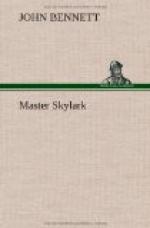A printer’s man was bawling, “Will ye buy a new book?” and the fruit-sellers, too, were raising such a cry of “Apples, cherries, cakes, and ale!” that the little noise Nick might make would be lost in the wild confusion.
Master Carew and the manager had not come out of the tiring-room. Nick got up on the stool and looked out. It was not very far to the ground—not so far as from the top of the big haycock in Master John Combe’s field from which he had often jumped.
The sill was just breast-high when he stood upon the stool. Putting his hands upon it, he gave a little spring, and balanced on his arms a moment. Then he put one leg over the window-sill and looked back. No one was paying the slightest attention to him. Over all the noise he could hear the man tuning the viol. Swinging himself out slowly and silently, with his toes against the wall to steady him, he hung down as far as he could, gave a little push away from the house with his feet, caught a quick breath, and dropped.
CHAPTER XX
DISAPPOINTMENT
Nick landed upon a pile of soft earth. It broke away under his feet and threw him forward upon his hands and knees. He got up, a little shaken but unhurt, and stood close to the wall, looking all about quickly. A party of gaily dressed gallants were haggling with the horse-boys at the sheds; but they did not even look at him. A passing carter stared up at the window, measuring the distance with his eye, whistled incredulously, and trudged on.
Nick listened a moment, but heard only the clamor of voices inside, and the zoon, zoon, zoon of the viol. He was trembling all over, and his heart was beating like a trip-hammer. He wanted to run, but was fearful of exciting suspicion. Heading straight for the river, he walked as fast as he could through the gardens and the trees, brushing the dirt from his hose as he went.
There was a wherry just pushing out from Old Marigold stairs with a single passenger, a gardener with a basket of truck.
“Holloa!” cried Nick, hurrying down; “will ye take me across?”
“For thrippence,” said the boatman, hauling the wherry alongside again with his hook.
Thrippence? Nick stopped, dismayed. Master Carew had his gold rose-noble, and he had not thought of the fare. They would soon find that he was gone.
“Oh, I must be across, sir!” he cried. “Can ye na take me free? I be little and not heavy; and I will help the gentleman with his basket.”
The boatman’s only reply was to drop his hook and push off with the oar.
But the gardener, touched by the boy’s pitiful expression, to say nothing of being tickled by Nick’s calling him gentleman, spoke up: “Here, jack-sculler,” said he; “I’ll toss up wi’ thee for it.” He pulled a groat from his pocket and began spinning it in the air. “Come, thou lookest a gamesome fellow—cross he goes, pile he stays; best two in three flips—what sayst?”




